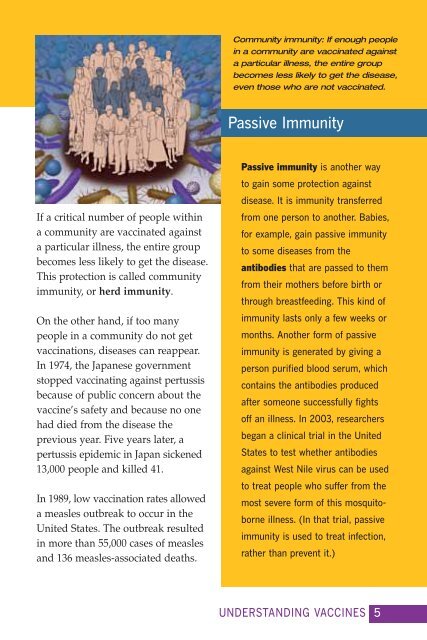Understanding Vaccines What They Are How They Work - VIOLIN
Understanding Vaccines What They Are How They Work - VIOLIN
Understanding Vaccines What They Are How They Work - VIOLIN
Create successful ePaper yourself
Turn your PDF publications into a flip-book with our unique Google optimized e-Paper software.
If a critical number of people within<br />
a community are vaccinated against<br />
a particular illness, the entire group<br />
becomes less likely to get the disease.<br />
This protection is called community<br />
immunity, or herd immunity.<br />
On the other hand, if too many<br />
people in a community do not get<br />
vaccinations, diseases can reappear.<br />
In 1974, the Japanese government<br />
stopped vaccinating against pertussis<br />
because of public concern about the<br />
vaccine’s safety and because no one<br />
had died from the disease the<br />
previous year. Five years later, a<br />
pertussis epidemic in Japan sickened<br />
13,000 people and killed 41.<br />
In 1989, low vaccination rates allowed<br />
a measles outbreak to occur in the<br />
United States. The outbreak resulted<br />
in more than 55,000 cases of measles<br />
and 136 measles-associated deaths.<br />
Community immunity: If enough people<br />
in a community are vaccinated against<br />
a particular illness, the entire group<br />
becomes less likely to get the disease,<br />
even those who are not vaccinated.<br />
Passive Immunity<br />
Passive immunity is another way<br />
to gain some protection against<br />
disease. It is immunity transferred<br />
from one person to another. Babies,<br />
for example, gain passive immunity<br />
to some diseases from the<br />
antibodies that are passed to them<br />
from their mothers before birth or<br />
through breastfeeding. This kind of<br />
immunity lasts only a few weeks or<br />
months. Another form of passive<br />
immunity is generated by giving a<br />
person purified blood serum, which<br />
contains the antibodies produced<br />
after someone successfully fights<br />
off an illness. In 2003, researchers<br />
began a clinical trial in the United<br />
States to test whether antibodies<br />
against West Nile virus can be used<br />
to treat people who suffer from the<br />
most severe form of this mosquitoborne<br />
illness. (In that trial, passive<br />
immunity is used to treat infection,<br />
rather than prevent it.)<br />
UNDERSTANDING VACCINES 5


